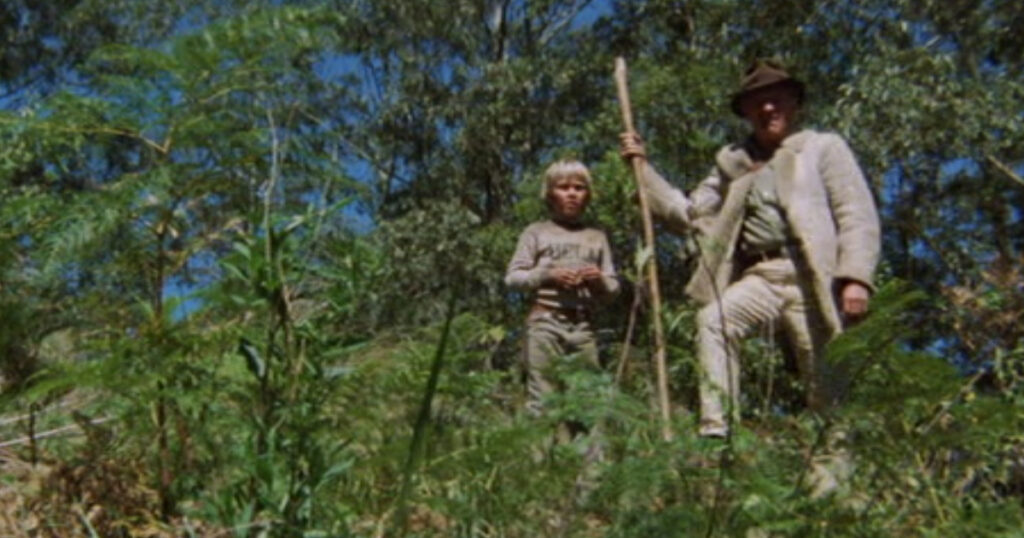[8]
The Earthling is an odd, disconcerting sort of film that nevertheless casts a spell and is a bit hard to shake when it’s over. It stars William Holden (Sunset Boulevard) in his penultimate film performance, playing a terminally ill man who returns home to his native Australia to die alone in the vast wilderness. Once there, he lives off the land, sleeping in makeshift lean-to’s, catching rabbits and fish, and eating roots and plants — his parents raised him to survive off the land in this way.
Enter supporting player Ricky Schroder, eight or nine at the time of filming, hot off The Champ and a year away from his Silver Spoons TV fame. Schroder’s character is the son of bickering parents who accidentally drive their camper off a cliff in a scene so comically jarring, it almost checked me out of the movie. Schroder begins an aimless trek, eventually crossing paths with the curmudgeonly Holden.
The crux of the film is the hyper-antagonistic relationship between Holden and Schroder. And I cannot overstate how antagonistic this relationship is — shockingly so. Given the premise, I fully expected The Earthling to get saccharinely sweet at times. Well, it resolutely does not. For half the film, I was alienated by the relationship. Holden is so incredibly mean to Schroder’s character — refusing to share food with him, share shelter with him, or even travel with him at times. At one point, Holden leaves Shroder stranded on a cliff chased by wild dogs. It’s off-putting and bewildering… to a point.
The film’s third act transforms the movie, finally shedding just enough light on Holden’s motivations — the inner as well as the outer ones — to make us look back over the journey and re-evaluate our feelings about it. One of my biggest suspensions of disbelief throughout the movie is laid to rest, when Holden explains why he never led Schroder back to civilization in the first place. To an extent, The Earthling is a movie about ‘tough love’, and that treatment is aimed at Schroder’s character as well as the audience. Tough love is only appreciated after you’ve survived long enough to reflect on it.
Director Peter Collinson (The Italian Job) paints a powerfully captivating atmosphere with this film. The Australian wilderness is heavy with living, breathing wildlife in every scene. It’s almost like a fairy tale. And it’s not just in cutaway stock photography like we often see. No, Cullinson surrounds his actors with rats, kangaroos, snakes and other exotic Australian wildlife within the same frame. I’ve never seen a film contain so much wildlife, and as an animal lover, it leaves a powerful impression.
The story’s climactic location, the ruins of an ultra-remote farm where Holden’s parents raised him, is magical. I wanted to stay there forever as a viewer. Steam rises from the creek surrounding the dilapidated cabin, emptying into a natural hot spring. Ducks, kangaroos, deer, and all manner of wildlife litter the location. It’s at this captivating, heavenly locale where the characters reach a modicum of resolution — remarkably free of any undue sentimentality — and The Earthling comes to an appropriate, emotionally satisfying ending.
While I love William Holden, I can’t say this is one of his best roles. Schroder, on the other hand, gives a stronger, more dynamic performance. I also found the music by Bruce Smeaton to be overly melodramatic at times, perhaps overcompensating for the emotionally-restrained screenplay. But I find imperfect films often have tremendous impacts on me, and The Earthling is the latest to do so. Halfway through, the movie wasn’t working for me and only the ambiance kept me watching. But then the third act made me re-evaluate the journey, and I started to fall in love with The Earthling. I’m still thinking about it a day later.
Note: This film has two different cuts. I watched the European version with the Bruce Smeaton score. The American version has music from other composers, including some folk songs, and reportedly removes material to soften Holden’s character.
With Jack Thompson and Alwyn Kurts.

